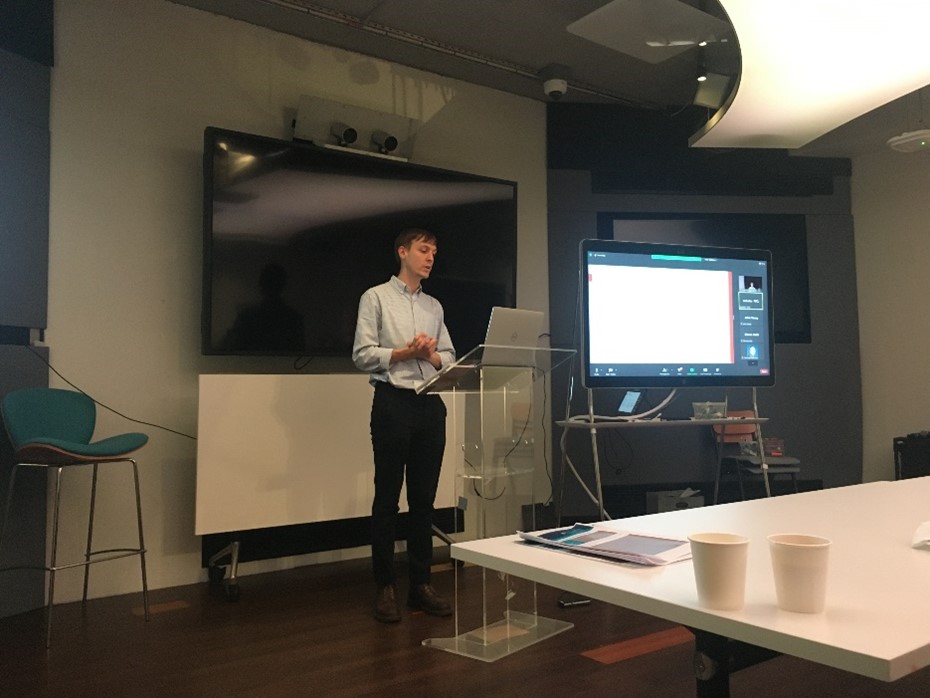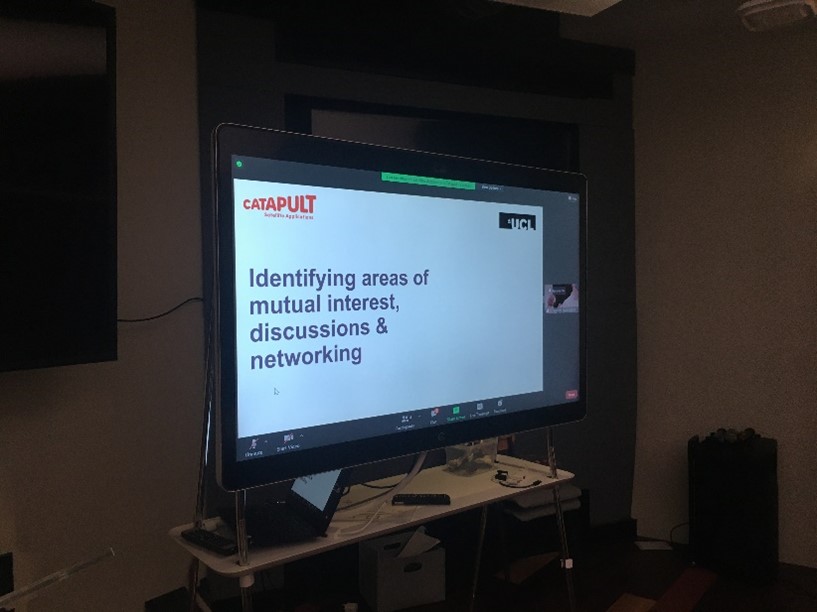In this hybrid Knowledge Exchange Sandpit event, the Satellite Applications Catapult joined forces with University College London (UCL) academics and researchers to find common areas of interest and promote collaboration on future projects. The day consisted of both presentations and networking, with the aim of encouraging attendees to discuss and develop cross-organisation project ideas, which could then be submitted as a proposal for UCL’s Innovation and Enterprise funding opportunity.
Overview of the Opportunities
After initial introductions from Professor Alan Smith (Head of the UCL Space Domain), the day kicked off with a presentation on the Satellite Applications Catapult’s current challenges and opportunities, delivered by the Knowledge Exchange Manager, Dr Eddie Ross. These opportunity areas were suggested in advance by Catapult attendees and covered the value streams: Geospatial Intelligence, Ubiquitous Connectivity, Access to Space, Future Systems, Net Zero, Extractive Industries, Health & Wellbeing, Agriculture, Intelligent Transport, and Emerging Markets.
This was followed by a presentation on the details of the Innovation and Enterprise funding opportunities, delivered by UCL’s Partnerships Manager, Kemil Thomas. The funding opportunities were available for short term projects up to six months in duration and up to a value of £30,000. Successful projects would promote knowledge exchange between UCL and the Catapult and would generate impact from research within the UCL Space Domain.

UCL Academic Show and Tell
A number of academics from UCL gave presentations outlining their existing Space-related research, highlighting areas of potential that could be developed further. These included:
- Jamie Dborin (PhD candidate in Quantum Technologies), who presented the TyTN (Tiny Tensor Networks) project (now TitanML), a quantum inspired AI tool for satellite onboarding processing. This would be used to reduce the volume of downstream data and increase the speed of response.
- Professor Christos Masouros, of the Institute of Communications and Connected Systems, presented his work on ‘Connectivity for 5G Networks and Beyond’, which spanned several areas including secure radar-communications, multiple-input multiple-output (MIMO) wireless, and remote energy autonomous systems.
- Dr Ingo Waldmann (Associate Professor in Extrasolar Planets, AI lead for UCL’s ESA lab, and co-founder of Spaceflux) outlined his work on the characterisation of planets using machine learning and its application to Space-derived challenges.
- Dr Marco Rocchetto (Research Fellow and co-founder of Spaceflux) spoke about using a ground-based telescope network for Space Situational Awareness (SSA).
- Professor Andrew Edkins, of the Bartlett Real Estate Institute, discussed UCL’s Off World Living Initiative and the future of human habitation on the moon and Mars, proposing steps needed to get there.

Breakout and Networking
The attendees then broke out into groups to discuss mutual areas of interest and identify areas where the organisations’ existing research and resources might be combined to form new projects based around knowledge exchange activities.
The in-person attendees largely grouped into two tables, with other discussions taking place virtually in tandem:
- The first table’s project idea centred around using ground-based telescopes for SSA in low Earth orbit (LEO). This would track satellites and use the light curves and machine learning techniques for 3D characterisation of satellites.
- The second table proposed a series of workshops involving UCL researchers from the TyTN project and Space sector stakeholders, with the aim of discussing the technological barriers and market needs of satellite AI on-board processing.
- There was also a discussion between UCL’s Prof. Andrew Edkins and the Catapult’s John Vesey regarding off world living. It was agreed that Andrew would target UCL’s Innovation Networks Fund to develop an off world living community of interest, which would have the support of the Catapult.
In addition, calls were set up between virtual and in-person attendees following the event. These included:
- John Vesey and Dr Micky Alexander (Senior Research Associate at UCL’s Institute of Health Equity, IHE) discussing overlaps between the research at the IHE and the Catapult’s Healthy Living Lab at Westcott.
- Dr Ashweeni Beeharee and Prof. Christos Masouros had a follow-on call whereby they discussed the three areas covered in Christos’ presentation and the overlaps with Catapult projects, seeking to translate theoretical research into standards-relevant hardware/software that could be tested at the Catapult’s facilities.
Outputs Summary
Three expressions of interest applications were submitted following the Sandpit event which were then approved to submit full proposals. These were:
- A series of workshops to explore AI for on-board processing led by Jamie Dborin at UCL, with Anastasia Bolton and Dr Cristian Rossi as the Catapult leads.
- A roadmap of theoretical secure radar-communications, to translate into standards relevant technology which can be tested the Catapult’s facilities led by Professor Christos Masouros at UCL, with Dr Ashweeni Beeharee as the Catapult lead.
- A proof-of-concept demonstration of the characterisation and mapping of in-orbit satellites using reflected photometry led by Dr Ingo Waldmann at UCL, with Laura Gonzalez Llamazares as the Catapult lead.
In December, we expect to hear the results of the full application outcomes.
Summary
The Knowledge Exchange Sandpit succeeded in meeting its goals of promoting engagement and collaboration between the Satellite Applications Catapult and UCL. Thank you to our speakers, and to everyone that attended the event.

